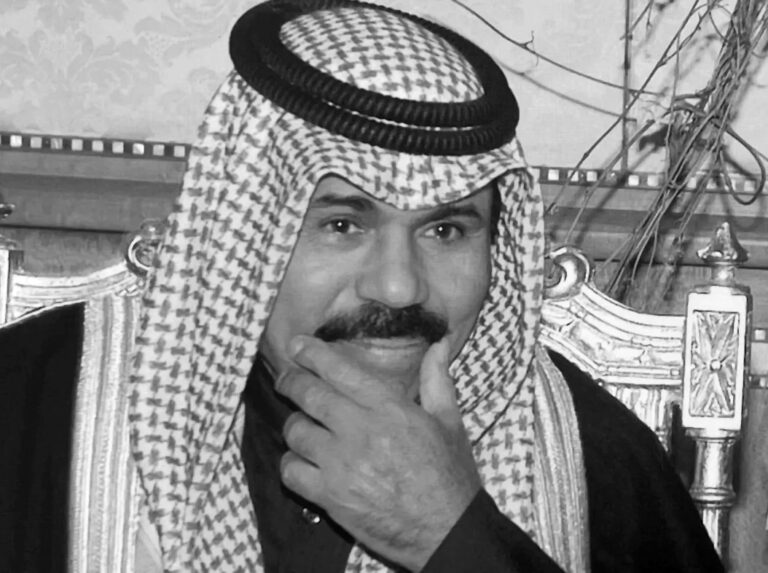Sheikh Nawaf a Beacon of National Solidarity

By Tareq Yousef Al Shumaimry
Editor-In-Chief
The late Amir Sheikh Nawaf Al-Ahmad Al-Jaber Al-Sabah who passed away on Saturday, 16 December was laid to rest on Sunday in the presence of His Highness the Amir Sheikh Mishal Al-Ahmad Al-Jaber Al-Sabah and prominent members of the Al-Sabah family. Earlier in the day, His Highness the Amir performed Sunday prayers on the late Amir at the Belal bin Rabah Mosque in Siddeeq district.
Prayers on the deceased were also performed by National Assembly Speaker Ahmad Al-Saadoun, senior Sheikhs, former prime ministers Their Highnesses Sheikh Nasser Al-Mohammad Al-Ahmad Al-Sabah, Sheikh Jaber Mubarak Al-Hamad Al-Sabah, Sheikh Sabah Khaled Al-Hamad Al-Sabah and His Highness the Prime Minister Sheikh Ahmad Nawaf Al-Ahmad Al-Sabah, senior officials and citizens.
On Saturday, an extraordinary cabinet session chaired by His Highness the Prime Minister Sheikh Ahmad Nawaf Al-Ahmad Al-Sabah, mourned the sad demise of His Highness the Amir Sheikh Nawaf Al-Ahmad Al-Jaber Al-Sabah earlier in the day.
The cabinet also named His Highness Sheikh Mishal Al-Ahmad Al-Jaber Al-Sabah as the new Amir of Kuwait.The late Amir who was hospitalized in November due to an emergency health problem had been reported to be recuperating and in a stable condition over the past two weeks by daily official updates from the Amiri Diwan.
The Council of Ministers expressed condolences and paid rich tribute to the achievements of the late Amir. “Our father, leader of our march, His Highness the Amir Sheikh Nawaf Al-Ahmad Al-Jaber Al-Sabah, has passed away following a journey of dedication and loyalty to his nation and its people,” said His Highness the Prime Minister Sheikh Ahmad Nawaf Al-Ahmad Al-Sabah.
He added that the Council of Ministers recalled the many sacrifices of the late Amir during his life dedicated to the development of the nation in all fields and to the service of its people.
Adding to the solemn sentiments expressed by the Council of Ministers, the Deputy National Assembly Speaker MP Muhammad Al-Mutair expressed condolences on behalf of the parliament and on his personal behalf to the bereaved family of His Highness the late Amir and to all the people of Kuwait.
He pointed out that the death of the late Amir was a big loss not only for Kuwait, but also the entire Arab and Muslim world. He beseeched Allah Almighty to have mercy on the deceased and to make his last day his happiest day.
A staunch advocate of the constitution and its role in guiding democracy in Kuwait, the late Amir was known to hold the constitution and its provisions in the highest esteem. On taking his constitutional oath as the 16th Amir of Kuwait three years ago, the late Amir noted that the constitution guaranteed a “smooth transition” of leadership and ensured “stability and sustainability” for the nation.
He added that he would do his utmost to carry out the “responsibilities entrusted upon me by the people, in accordance with the constitution and the principles of democracy.”
Born on 25 June, 1937, Sheikh Nawaf Al Ahmad was the son of the tenth ruler of Kuwait Sheikh Ahmad Al-Jaber Al-Sabah, and a half-brother to his immediate predecessor Sheikh Sabah Al Ahmad. Growing up in Dasman Palace, Sheikh Nawaf completed his secondary education in Kuwait.
On his return to Kuwait, the 25-year-old Sheikh Nawaf immediately entered into the service of his nation by accepting his appointment as governor of Hawally in 1962. From his first appointment to public service to his sad demise last Saturday. The late Amir devoted over six decades of his life to serving his beloved nation and its honorable people.
One of the longest serving members from the Al-Sabah family in public service, Sheikh Nawaf held a list of top posts in the government. Following a 16-year stint as Governor of Hawally, in 1978, he was for the first time inducted into the cabinet headed by Prime Minister Sheikh Saad Al Abdullah Al Sabah to serve as the country’s Minister of Interior.
He would continue to hold this post through several consecutive cabinets until 1988. During his ten-year tenure heading the interior ministry, he brought about various significant reforms aimed at transforming Kuwait’s police force into an efficient and modern security apparatus.
In January 1988, he was appointed as Minister of Defense and he continued in that role until the Iraqi invasion of Kuwait in August 1990. Following the liberation of Kuwait in February 1991, Sheikh Nawaf was appointed as the acting Minister of Labor and Social Affairs, before being appointed as Deputy Chief of the Kuwait National Guard under the guidance of the Chief of the National Guard, Sheikh Salem Al Ali Al Sabah.
As Deputy Chief of the National Guard, Sheikh Nawaf brought about significant changes to the form and functioning of the 26,000 strong independent paramilitary force of Kuwait. He would hold this strategic post for the next nine years before his appointment as Deputy Prime Minister and Interior Minister in the cabinet headed by Sheikh Sabha Al Ahmad Al Sabah in 2003.
Three years later, in 2006, when Sheikh Sabah Al-Ahmad assumed the leadership as Amir of Kuwait, an Amiri Decree was issued on 7 February to officially designate Sheikh Nawaf as the Crown Prince of Kuwait. In July of 2020, when Sheikh Sabah Al-Ahmad left for post-operative medical care in the United States, Sheikh Nawaf was appointed as Deputy Amir and temporarily given some of the Amir’s constitutional duties.
Following the death of Sheikh Sabah Al-Ahmad Al-Sabah on 29 September, His Highness Sheikh Nawaf was appointed as the new Amir of Kuwait. A day later, a special session of the National Assembly heard the 83-year old Sheikh Nawaf Al-Sabah take his constitutional oath as the 16th Amir of the State of Kuwait.
Throughout his career the late Amir served as a reliable pillar in buttressing internal and external security and played a vital role in supporting programs that strengthened national unity. and in enhancing cooperation among the six-nation Gulf Cooperation Council (GCC) states and the wider Arab world.
The soft-spoken late Amir was quite popular for his quiet style of functioning, accomplishing much without much fanfare. Regional and Arab leaders appreciated this low-profile statesmanship and diplomacy that strengthened peace and solidarity in the region. The late Amir was also held in high esteem by citizens for his graciousness, his forgiveness, his genuineness, and his noble humanitarian principles.
This genuine fondness among people for the late Amir was reflected in the sincere outpouring of grief on hearing the official announcement of his demise on Saturday. Citizens from all walks of life expressed deep sorrow on the passing away of the late Amir, and eulogized him as a paragon of humility, equanimity, graciousness and benevolence. They described their late Amir as a devout Muslim and an epitome of tolerance, good deeds, and humbleness.
The late Amir was characterized by wisdom, moderation, and foresight in pushing forward social and political reconciliation, and economic reforms in Kuwait. During his relatively brief three years as the Amir of Kuwait he left an indelible mark through his statesmanship in building bridges of amity in the country and across the region. He was recognized for his staunch support to strengthening rapport within the six-nation Gulf Cooperation Council (GCC) bloc, as well as for furthering peace and solidarity across the wider Arab and Muslim world.
A leader who believed firmly in forgiveness and reconciliation, the late Amir’s major legacy in the country would be his political recalibration policy that played an influential role in uniting the citizenry under the common umbrella of one people, one nation.
Recognizing the power of dialogue in reconciling differences and in building unity among the people, and the importance of political stability to ensure sustainable development of the country, he set about stitching a cohesive political and social fabric in Kuwait.
Leading by example, the late Amir generated immense goodwill and trust among opposing factions by initiating a series of Amiri pardons over the past three years. The Royal pardons and amnesty set free several members of the opposition who were sentenced for their beliefs and actions, and brought home political detractors who were in self-imposed exile abroad.
He continued his political reset by affirming his commitment to the constitution and adherence to the principles of democracy, by promising non-interference in the electoral process.
The outcome of this policy was that the last elections held in Kuwait was one of the freest in recent memory, and resulted in the election of the National Assembly Speaker and various parliamentary committee members without intervention by the government.
After years of political instability and parliamentary discord, the political restart initiated by the late Amir helped usher in a national reconciliation and a spirit of camaraderie between the executive and legislative in parliament.
The onus of continuing the political legacy left behind by the late Amir will now be on the incoming leadership. Perpetuating political stability has never been more important to Kuwait than now, especially given the geopolitical instability wracking the region.
As a political commentator concluded in a media obituary on the demise of the late Amir, “Kuwait’s challenges are plenty. Meeting the growing needs of the people while charting a secure path for a small country surrounded by large states in a tough neighborhood has never been easy.
It requires a unity of purpose and unleashing the stalled, multifaceted development sorely needed for Kuwait to remain relevant and thrive in an ever-changing region.”
Known to be close to citizens throughout his life, the late Amir shared their pain and their joy, cared for their needs and aspirations, and worked tirelessly for peace and prosperity of the people. He was that rare leader who sincerely loved his people, and was in turn loved and respected by all people.
His many achievements, contributions, and initiatives over the past six decades of a life dedicated to the nation and its people, will etch his name deeply in the national consciousness and in the collective memory of the nation.
We pray to Almighty God to grant mercy to the soul of the late Amir and to bestow on him the honor of an eternal resting place in Paradise.















